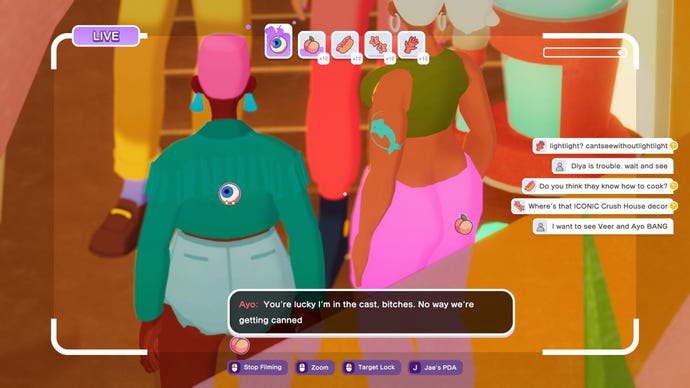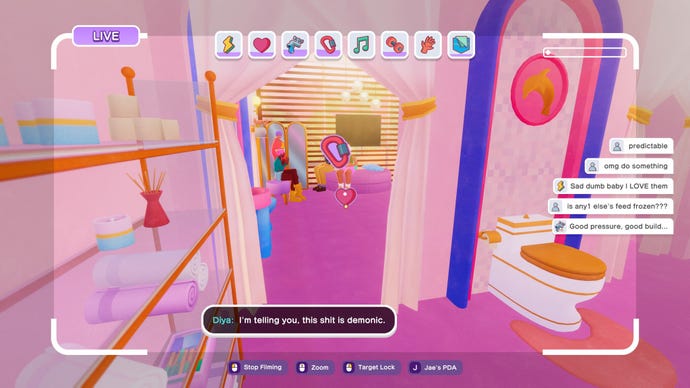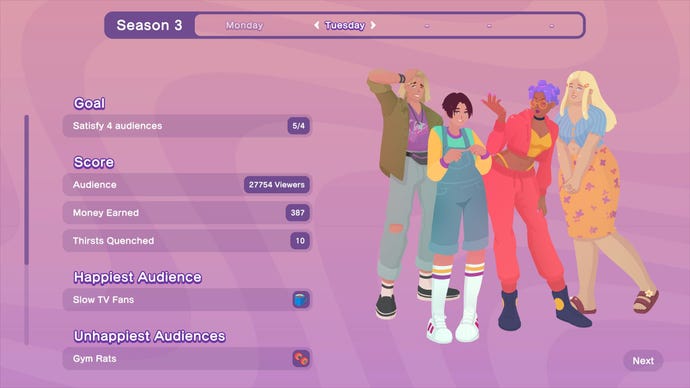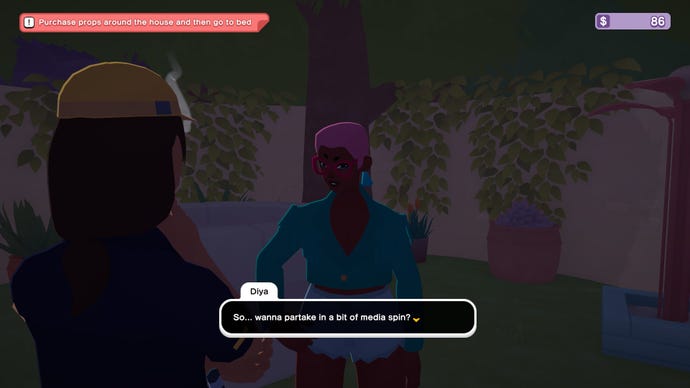When I zoom the camera on Alex’s momentarily untensed face while he’s dozing by the pool, it’s not because I’m a creep. When I pursue Ayo and Dija around the garden, keeping their feet and butts in shot as they belittle each other, it’s not because I’m a busybody and a lech. And when I pan to the lighthouse piercing the sunset beyond the security spikes it’s not out of any feeling of wonder, or even curiosity about possible escape routes. Please understand: I do not see these people, these objects at all, just the boneless, faceless traces they leave upon my own servitude to the lens.
In the past I’ve described The Crush House as a parody of reality TV, but that’s not how I feel about the game I’ve reviewed. The description fits the premise, of course: in this sunny first-person hybrid of management game, roguelike and immersive sim, you are the sole camerawoman for a 90s reality TV show that takes place on an island off the coast of Malibu. Seasons of the show last a week, each beginning with the selection of a four-person cast from a pool of 12 characters. The characters cover a range of obnoxious archetypes, from rosy-cheeked prudes to swaggering gym rats, all of whom look like slightly spaghettified versions of the Sims.
Every day, you seize your camera, set forth from your stagnant basement lodgings, and film everybody roaming the mansion above while they play-act at being a household. What you film is determined by a randomised collection of viewer demographics spanning many ages, genders, backgrounds and peccadilloes. Each audience group has a HUD icon that must be filled up by shooting footage that scratches their itches. There’s also a bubbling chat feed that offers more specific hints about audience preferences, such as people whinging about the zoom level. When not capturing footage, you’ll screen adverts – cheekily contributed by other indie game developers, such as Bennett Foddy and Bay 12 – to earn the means to buy new props for the house, again with particular audiences in mind.
Fail to sate the required number of demographics each episode, and on Normal difficulty, the show will be cancelled, forcing you to start the day over. Make it all the way to Saturday, and you’ll join the cast for a ride on the Success Slide, a hoop of gaudy, plastic intestine grafted to the Crush House’s top floor. Success, however, simply means beginning afresh: you’ll reappear inside the starting elevator, replay the (brief) tutorial dialogue with your assistant producer over walkie-talkie, and choose another cast for the next season. The challenge increases with each season: there are fresh demographics to figure out, and more of them to satisfy per episode. And so, of course, does your suspicion about the real nature of the show, which teems with sinister set dressing: the snot-green Crush Juice everybody can’t stop drinking, the swivel-eyed Korby mascots, the satellite dish on the hill above the mansion.
There are callbacks to many reality TV shows in The Crush House, more than I can pin down. The mansion soundtrack of watery nu-metal and R&B is pure MTV (you can change the muzack to appease certain audiences). The characters hold up a mirror to everybody from Nasty Nick to the Kardashians. But I’m not sure this game is about nostalgia for reality TV, in practice. It’s about Content, in the present-day, always-online sense of the term – delicious, amorphous, disembodied content. Content, coursing through the pipes of the Success Slide. Content, dripping with an audible glug-glug into the audience icons on your feed.

Filming Content isn’t the same as filming people. Reality TV needs stars, powerful egos with that boutique blend of photogenic and sympathetic and unbearable. The Content industry doesn’t need stars, though it may sporadically reward them. It needs profitable configurations of text, imagery and sound, with “profitable” defined by “audiences” that are themselves arbitrary homunculi of marketing data. There is room for the figure and anatomy of the human being only inasmuch as it can be stretched and smeared to fit whatever datapoints are in vogue.
This comes across, beautifully and unpleasantly, in how the game chaperones your camerawork and slowly bleaches away all question of technique. You might expect to earn the biggest rewards from clean, soap opera-style footage of the bodies and faces of housemates in conversation. And that’s sort of how it works initially. The earlier audience demographics you unlock are focused on the human components of the scene: they want to see blossoming tenderness, squabbles, flirting, snogging, the good stuff. There’s more leisure at this stage to practise your craft, encouraged but not compelled by the gentle goading of your daily objectives.
The act of finding creative angles to shoot from is akin to finding a good sniping spot or obscure route in Dishonored, and the game is surprisingly parkour-friendly, with a running jump and (fiddly) auto-ledge grab. The Crush House itself is compact and relentlessly transparent, made up of plate glass and doorless alcoves – a panopticon with a conversation pit. You’ll memorise the layout in no time. But the movement of the characters, the buying of props, and the scrambling of audience demographics perform small acts of reinvention from episode to episode. There’s a wealth of authentically bitchy writing in the game, with lines for every combination of cast members, and part of the job is obviously matching up people who are likely to have chemistry of one kind or another.
It’s an inglorious, sordid living. Still, there’s an art to it. I take serious pride in a few of my scenes from the early game, like the full cast shot I filmed while standing on the kitchen chandelier. But as you unlock more audiences, the mathematics of Content overtake the crafting of drama. Some of the viewerships make no sense at all. The plumbing enthusiasts want to look at the house’s single luxurious toilet all day (so do the people with motion sickness and the uber-rich kids, for different reasons). The Pharologists are endlessly curious about the lighthouse. The Foodies hanker for imagery of posh kitchenware and performative pot-stirring. And while the Voyeurs are… intrigued by the cast, they would often prefer you film each housemate on their own and at a distance, without the target’s awareness.

Slop those last four demands together, and the moneyshot becomes a crouched perspective from behind the kitchen sink, with a bowl of fruit half-obscuring your view of somebody having a smoke by the pool – and the lighthouse juuuust visible through the conservatory on the left. Sometimes, The Crush House motivates you to take footage of nothing at all: glimpses of failing shadows through gauzy folds of peach-foam glass, which somehow trigger a geyser of thirst icons and a satisfaction multiplier represented as ludicrous, Naruto-style acceleration lines.
You might call this a failure of the game’s simulation of reality TV. While I can’t quite speak to the developer’s intentions, I think it’s actually a very successful representation of how our networked entertainment sphere has slyly squeezed out both human agency and increasingly, human spectatorship. Again, it feels more like a commentary on Content, on Thinking With Data and in particular, on generative AI.
Rather than just lampooning the preening idiots who find their way onto reality TV shows, the game takes aim at how today’s digital economy hoards and regurgitates information based on its own, undead modelling of curiosity and desire. It encourages you to behave not like a gossip or a peeping Tom but a sexless and soulless CAPTCHA drone, orienting itself to isolate fixtures that fit the target metrics. When I film people on the loo, or while they’re kissing, or while they’re visibly distressed, it’s not because I’m a paparazzo aiming to titillate or scandalise or force some empathy. I don’t see the “talent” at all, just taggable hues or attitudes that need to be converted into numbers.
I’m linking this to the present-day digital content economy, but the themes above took shape in the 1960s. Guy Debord writes about something similar in The Society Of The Spectacle, describing how “the specialization of images of the world has culminated in a world of autonomized images where even the deceivers are deceived” – a capitalist endgame in which everybody’s alienation from everybody else is total, and the system of production and representation operates without instruction or interruption, bestowing agency on spectacular commodities rather than the gloomy consumer-labourers doomed to traipse back and forth between workplace and marketplace. The Crush House is Debord’s “vicious circle of isolation” in miniature. It is a place of zero privacy and yet, absolute loneliness: everybody present is faking it, and the economic systems that structure this syrupy pocket of spacetime do not regard the participants as people.
Having taught you to behave like a drone, The Crush House turns the screws. It’s a surprisingly difficult experience, with a constipated mid-game. You can’t see which audience types will surface during a season, and certain combinations of cast and viewing demographic are nigh-incompatible. Hard to do much for a viewership that wants to ogle the lads when you have an all-girl season, for example.

The game throws you a lifeline by arranging for thirst points from sated demographics to spill over into those you’re still wooing: unconvinced viewers get swept along by the excitement of the rest, basically. The house props also compensate for the trickier cast/audience match-ups: if you need to engineer a Wholesome Moment, buying a kitsch dog statue might get warring parties chatting about their pets. But props are pricey, even once you learn to optimise the ads and skip to commercials that suit the viewers of the day. I only ever earned enough to buy a couple of cheap items or a single prestige item per season. By season five, with six or more audience demographics to nail every episode, I was striking out several times a season. I grew to despise the production assistant, who makes you take the walk of shame to the underground Failure Slide every time – there are no instant restarts in The Crush House, which feels entirely deliberate.
There’s the option of playing on Easy, which does away with the threat of cancellation, but that’s not the “recommended” setting, and I do think The Crush House needs its grind for thematic purposes. The lesson you’re supposed to learn, I think, is that being good at your thankless, dehumanising job will only cause management to expect more from you. The challenge is to do your job well enough to survive, while pursuing something other than your job. Not just the foetid secrets of the Crush House itself, but the possibility of genuine community with the people inside it.
This begins, perhaps, with realising that some of the viewer comments on your feed are aimed at you specifically, with people chatting about your angles, and making guesses about your own preferences as a viewer. It’s a reminder that your character isn’t just a spectral articulation of the House’s thirstiness. She has a name, Jae, a body palpable from the clomping of her army boots, and a past she’s trying to recall. From there, you might try listening to the cast – really listening, not just tactically snuffling around for atomised keywords like a shark scenting blood particles, but prying open a few seconds within the arc of each episode to lower the lens and follow a conversation. The conversations are all pretty contrived, but their fakeness is real. The grift is honest, and even relatable.

And then there’s what happens between episodes. Night is when you get to rove the mansion at your leisure, with no viewers to appease, buying props for the next episode. In the process, you might stumble into a cast member with an illicit request about how you portray them on-air. The Labrador-like Alex is a former high school loner who’d like you to show him making a friend or two. Bulging pornstar Emile wants you to provoke his fans by filming him kissing somebody while hiding the other person’s identity.
These favours aren’t exactly Hero’s Quests, and fulfilling them can be maddening given all the other pressures. There’s one that requires you to avoid filming butts for a whole episode, which I attempted several times only for a rogue buttock to sneak its way into the screen corner at the last second. The game gives you the option of turning requests down, even scornfully. But helping other people is helpful for you. Amongst other things, it triggers additional encounters, unlocking the way to other areas deep beneath The Crush House, which harbour the hope of escape.
I’m going to break it off here – partly because after 10 hours, I’m still plumbing those depths, and partly because I’m not sure any plot catharsis can exorcise the demons this game conjures. It feels perversely appropriate to leave The Crush House unfinished: we may be able to escape from The Crush House, but I’m not sure we can escape from the idea of The Crush House, not while there is Content to generate.
Inevitably, reviewing the game has made me think about my own job in content creation, aka video game journalism – how the mechanics of my trade teach me to treat readers as aggregates of preferences and compulsions, and the importance of repeatedly carving out some headspace for sympathy and community. I’m not sure The Crush House is enjoyable, beyond the opening thrill of wielding the lens and toying with the systems, but it is enlightening. It is a triumphant performance of dystopia, one that concentrates the understanding rather than merely wallowing in the shit. It takes enormous insight to make something this ugly.











Add comment